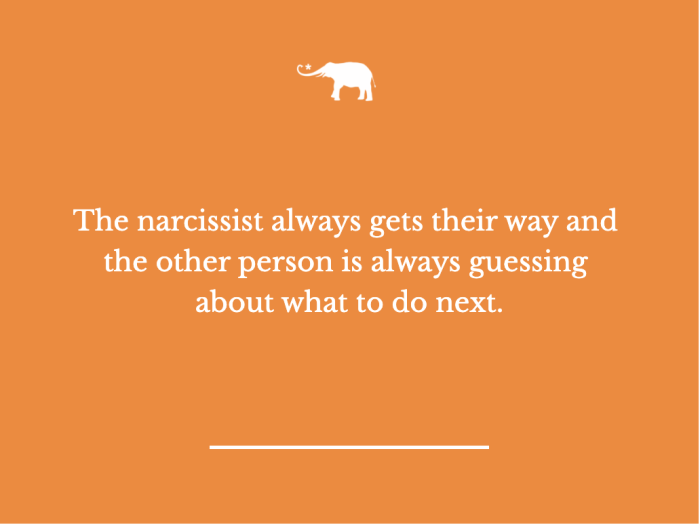Advice for Identifying & Overcoming the Narcissistic Abuse Cycle
Gaslighting, crazy making, trauma bonding, cognitive dissonance and terrible advice from people trying to help can make identifying narcissistic abuse feel impossible. You may wonder if you were really the toxic one. Especially if the narcissist is telling you everything was your fault!
One of the best ways to figure out if you were in a relationship with a narcissist is to identify the rules of the relationship. In a healthy relationship there is a dynamic where both people follow the same standards. Both people in the relationship take turns and, therefore, both people have their needs met. In a toxic relationship one person makes the rules, breaks the rules and enforces the rules while the other person is expected to follow the rules. This allows the narcissist to remain in control without having to do the work of the relationship. The narcissist is able to protect their image and blame shift so they do not have to take responsibility for how their behavior can affect others. The narcissist always gets their way and the other person is always guessing about what to do next. This leaves people who are stuck in a narcissist abuse cycle feel as if they are walking on eggshells. They are doing the work of the relationship, but the relationship never seems to work.
If you are in a relationship with a narcissist then the narcissist is probably the main event of your life. Their needs, wants, moods, desires and goals take up all the space in the relationship. To survive you tried to be one step ahead in knowing how to make them happy and avoid conflict. To break the cycle of narcissist abuse we have to learn to become the main event of our own lives again. We have to turn our heads, stop looking at the toxic person and look in the mirror. We have to learn what our own needs are, reconnect with our strengths and become the main events of our own lives.
Many people begin their healing process by studying narcissism and other personality disorders. This helps people who have suffered from a relationship with a narcissist by seeing patterns of behavior and recognizing they are not alone in their pain. It is important to note that if you want to break the cycle of narcissistic abuse that studying narcissism is an important first step, but it is not the final step! If your relationship was all about the narcissist then you can’t heal from a narcissist by making the narcissist the main event of your healing journey. The problem with your relationship was that it was always about them! Don’t make the mistake of making your healing process all about them too. Think about the narcissist as a crocodile. If you know a crocodile is deadly you don’t get into the water to figure out what breed of crocodile it is, or what happened in the crocodile’s childhood to make it so ornery, or obsess over exactly how quickly this type of crocodile could kill you. You stay out of the water!
Far too many people make the mistake of studying narcissists rather than staying away from narcissists. They study crocodiles instead of staying out of danger. This is because the narcissist has trained them to think about the narcissist instead of thinking about themselves. The narcissist is still the main event! While studying narcissism is an extremely helpful first step, for you to truly heal you need to learn to become the main event of your own life again. It’s important to find mental health professionals, support groups, podcasts, videos and written material that teach you how to stop focusing on narcissism and start having a healthy relationship with yourself again.
After a toxic person encounter focusing on yourself can feel really scary! You might feel selfish, you might recognize you don’t have any idea what you want or what you need. You might feel uncomfortable when you are not over giving or putting someone else’s needs above your own. However, becoming the main event of your own life is the only way to stop the narcissistic abuse cycle. If you struggle with putting yourself back in the main frame of your own life then it often helps to think of leading by example.
Every great parent and wonderful leader I know says they want to lead by example, but if you are used to focusing on everyone’s needs but your own it can be difficult to execute. However, would you ever hire a nutrition coach who told you to eat a salad while they were eating potato chips? Would you hire a financial advisor who told you to save money while they ran up credit card debt? Would you hire a math tutor for your child who had failed math? My guess is you respect people who take their own advice and don’t respect people who say one thing and do another. You probably want your child to get rest, have peaceful relationships and experience a healthy balance of prioritizing their own needs and thinking of others. The best way for your child to have healthy relationships is seeing you have healthy relationships. Both in your relationship with yourself as well as your relationship with others. I have never heard someone say “My parents had great boundaries and a wonderful sense of self. They were so emotionally healthy! They really balanced their own needs while also thinking of others. I think their superior emotional health and self awareness really damaged me.”
If you struggle with feeling selfish for making your own needs a priority then remind yourself that taking care of your emotional needs and modeling a healthy relationship with yourself as well as having healthy relationships with others is a great gift to your children. From birth to death you are the only person you are stuck with for life. Don’t forget to remember you. The narcissist may not like it, but the healthy people in your life will thank you for it.









Read 0 comments and reply